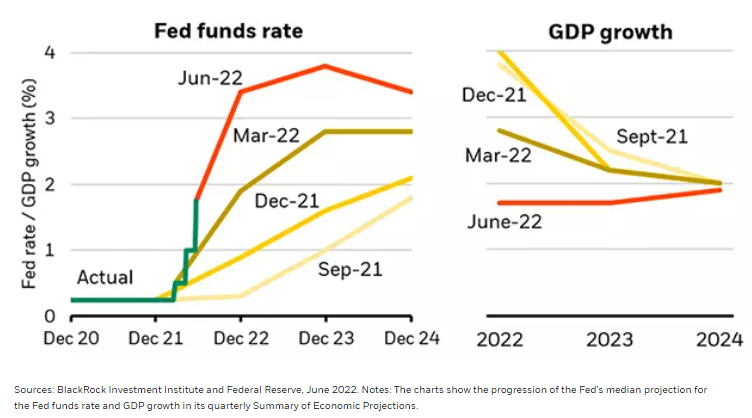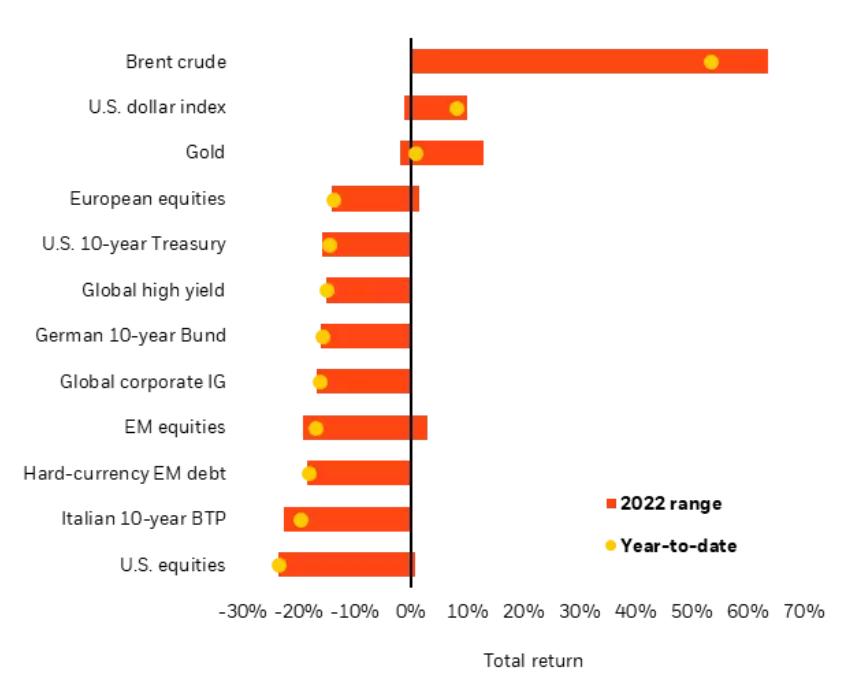Jean Boivin, Head of the BlackRock Investment Institute together with Wei Li, Global Chief Investment Strategist, Alex Brazier, Deputy Head of the BlackRock Investment Institute and Vivek Paul, Senior Portfolio Strategist all forming part of the BlackRock Investment Institute, share their insights on global economy, markets and geopolitics. Their views are theirs alone and are not intended to be construed as investment advice.
Key Points:
A serious growth risk: We see the Fed on a path to raise rates far enough this year to hurt growth. The U.S. activity restart from the pandemic could grind to a halt in coming quarters.
Market backdrop: The Fed lifted rates by 0.75% in a rush to normalize policy, its biggest hike since 1994. Other central banks joined, sending shockwaves through markets.
Week ahead: This week’s U.S. and European PMI updates will give an early read on growth momentum in June and help gauge the easing of supply chain disruptions.
A flurry of central bank moves last week has revealed that many are ignoring the crushing effect this will have on growth. This dynamic raises serious growth risks, and we now see the U.S. restart of economic activity stalling over the coming quarters. The focus is on the Fed – and we think it will ultimately change course but not before causing growth to stall. This raises the specter of growth weakness but still persistent inflation. We don’t see this as an environment for buying the dip.
Fed Prjections
Fed funds and GDP growth projections by meeting

The Fed’s updated “dot plot” of the Fed funds projection shows it’s ready to push rates to nearly 4% by next year (red line, left chart). This takes rates well beyond neutral of around 2.5% – the level that neither stimulates nor decreases economic activity. Yet the Fed continues to forecast trend-like growth (red line, right chart). Financial conditions are already quickly tightening. And with growth slowing elsewhere and higher energy prices, we expect a worsening macro environment for the rest of the year and into 2023. The Fed isn’t looking for a recession, even though in our view one would be needed if it wanted to drive inflation back down to 2%. So we expect the Fed to change course once it becomes clear growth has stalled.
The Fed seems dead set on raising rates this year to levels that, in our view, would clearly slow the economy. It seems to be responding to the “politics” of current high inflation. But the Fed isn’t actually looking to slow the economy. Fed Chair Jerome Powell said the central bank is not trying to induce a recession. This reflects the Fed’s lack of acknowledgment of the policy trade-off. Current high core inflation rates reflect an imbalance of demand and supply broadly across the economy. It isn’t due to overheating demand but unusually low production capacity in an incomplete restart following the pandemic.
A policy trade-off
In fact, the Fed is facing an acute trade-off: either slam down activity or live with persistent inflation while production capacity recovers. The Fed hasn’t acknowledged this. It assumes that a rapid return of supply capacity will help resolve high inflation – so any upside surprise to inflation will push it toward tighter policy, and a downside surprise on inflation won’t necessarily slow it down. If the Fed jacks up rates and then changes course as we expect, it still raises the risk of zero or negative growth and persistent inflation. When the macro environment is shaped by production constraints, the Fed can’t avoid volatility. It can only trade inflation volatility for output volatility – a big theme at our 2022 Midyear Forum last week. We may be set for both, posing a further drag to risk assets.
How does the inflation/growth trade-off play out elsewhere? We think the European Central Bank (ECB) will be forced to confront reality sooner because the euro area will feel economic pain sooner. The ECB’s planned policy normalization underappreciates the risk of the energy crisis pushing the euro area into recession. The ECB’s troubles are seen in the peripheral bond volatility that sparked an emergency meeting last week to help steady financial conditions across the euro area. That comes as the Swiss central bank and the Bank of England (BOE) also raised rates last week, with the BOE warning of recession risks. The BOE is closer to acknowledging the policy trade-off and could decide to go slow on further rate hikes. The Bank of Japan bucked the trend, keeping its ultra-accommodative stance, largely because inflation remains low and Japan did not have harsh lockdowns driving the inflation volatility in other major economies.
What this all means for investments
We already reduced portfolio risk twice this year on growing concerns over the effect of the energy crunch on growth and central banks overtightening. This is why we don’t see the risk asset retreat as a reason to buy the dip – and expect more volatility ahead.
Market backdrop
The S&P 500 slid into bear market territory after the Fed lifted rates by the most in three decades. The Fed said it could push rates to 3.4% this year – a level that would hurt activity and could bring the restart to a halt, in our view. Other hawkish central bank moves followed. The Swiss National Bank unexpectedly hiked rates for the first time in 15 years. We think central banks’ failure to acknowledge policy trade-offs amid the politics of high inflation raises serious growth risks.
Services and manufacturing data in the U.S. and Europe will give an early read on growth momentum in June and help gauge the ongoing easing of supply chain disruptions. We think the risks to growth are escalating as many central banks steadfastly hike rates without fully acknowledging the high costs. UK inflation is likely to remain high in data out this week, fueling calls for a continued hawkish response from the Bank of England.


Week Ahead
- June 22: Euro area consumer confidence; UK CPI
- June 23: U.S., euro area, UK and Japan flash PMI data; Japan CPI
- June 24: UK retail sales; Germany Ifo survey; Brazil CPI
BlackRock’s Key risks & Disclaimers:
This material is not intended to be relied upon as a forecast, research or investment advice, and is not a recommendation, offer or solicitation to buy or sell any securities or to adopt any investment strategy. The opinions expressed are as of April 25th, 2022 and may change. The information and opinions are derived from proprietary and non-proprietary sources deemed by BlackRock to be reliable, are not necessarily all-inclusive and are not guaranteed as to accuracy. As such, no warranty of accuracy or reliability is given and no responsibility arising in any other way for errors and omissions (including responsibility to any person by reason of negligence) is accepted by BlackRock, its officers, employees or agents. This material may contain ’forward looking’ information that is not purely historical in nature. Such information may include, among other things, projections and forecasts. There is no guarantee that any forecasts made will come to pass. Reliance upon information in this material is at the sole discretion of the reader.
The information provided here is neither tax nor legal advice. Investors should speak to their tax professional for specific information regarding their tax situation. Investment involves risk including possible loss of principal. International investing involves risks, including risks related to foreign currency, limited liquidity, less government regulation, and the possibility of substantial volatility due to adverse political, economic or other developments. These risks are often heightened for investments in emerging/developing markets or smaller capital markets.
Issued by BlackRock Investment Management (UK) Limited, authorized and regulated by the Financial Conduct Authority. Registered office: 12 Throgmorton Avenue, London, EC2N 2DL.
MeDirect Disclaimers:
This information has been accurately reproduced, as received from BlackRock Investment Management (UK) Limited. No information has been omitted which would render the reproduced information inaccurate or misleading. This information is being distributed by MeDirect Bank (Malta) plc to its customers. The information contained in this document is for general information purposes only and is not intended to provide legal or other professional advice nor does it commit MeDirect Bank (Malta) plc to any obligation whatsoever. The information available in this document is not intended to be a suggestion, recommendation or solicitation to buy, hold or sell, any securities and is not guaranteed as to accuracy or completeness.
The financial instruments discussed in the document may not be suitable for all investors and investors must make their own informed decisions and seek their own advice regarding the appropriateness of investing in financial instruments or implementing strategies discussed herein.
If you invest in this product you may lose some or all of the money you invest. The value of your investment may go down as well as up. A commission or sales fee may be charged at the time of the initial purchase for an investment. Any income you get from this investment may go down as well as up. This product may be affected by changes in currency exchange rate movements thereby affecting your investment return therefrom. The performance figures quoted refer to the past and past performance is not a guarantee of future performance or a reliable guide to future performance. Any decision to invest in a mutual fund should always be based upon the details contained in the Prospectus and Key Investor Information Document (KIID), which may be obtained from MeDirect Bank (Malta) plc.





